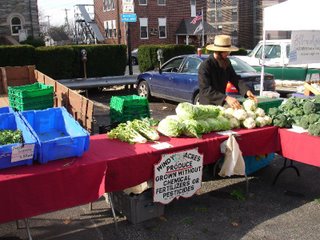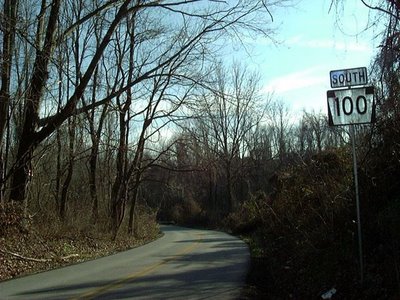This story appeared Oct. 31, 2005. It was awarded a First Place prize for Personality Profile in the Pennsylvania Newspaper Publishers Association's Keystone Press Awards contest.
By MICHAEL P. RELLAHAN
Staff Writer
WEST CHESTER - To borrow a timeworn phrase that nonetheless fit her well, Mary Catherine "Marie" Lynch was a survivor.
She survived the hard life of the streets, official indifference, terrifying violence, a crippling addiction to alcohol and personal demons that nearly destroyed her. She survived by her own force of will, with quite a bit of luck and through the kindness of people in her adopted hometown of West Chester.
But even survivors do not live forever. Lynch, diagnosed in 2003 with throat cancer, died Thursday morning at 12:15 a.m. in the Main Line Nursing Home in Paoli. She was 63.
"Even though she was a street person, she had some dignity," said Susan Baldwin, a former caseworker at West Chester's Safe Harbor shelter, who became her close friend. "I think she had a spunk about her. She asked that you give her the respect that she thought she deserved."
"Her recovery was one of the greatest turnarounds we ever saw," said Art Zadrozny, the former director of Safe Harbor who helped oversee Lynch's withdrawal from alcohol addiction and made her a part of the shelter's extended family.
Lynch went from living alone on the street, pushing her meager belongings in a shopping cart, drinking heavily and debasing herself, to kicking her habit, putting order in her life and eventually volunteering for others at Safe Harbor.
"There are definitely lessons to be learned from her," Zadrozny said in an interview Friday. "If anyone says they've had a bad hand dealt them, take a look at Marie's life. You can recover. You can change your life, because she did."
Lynch's personal history is punctuated mainly by gaps. She was born on Sept. 19, 1942, in Pennsylvania, but exactly where and to whom remains unknown. After her recovery, when Baldwin received a copy of her birth certificate in preparation for registering her for Social Security and official identification, the document didn't list either a place of birth or names of her parents.
She spent the first 20 years of her life as a ward of the state, living in an institution whose antiquated name was the Laurelton School for Feebleminded Girls of Childbearing Years. She endured violence there and may have been forcibly sterilized.
After leaving the school, she worked for two decades in a box-and-cup factory on the north side of West Chester until the factory burned down. With nowhere to go, Lynch spent the better part of the next 15 years on the streets of West Chester, a homeless woman with a slight frame and a rough, scarred face.
Those familiar with the town would see her sitting on a bench on South Church Street, pushing her cart along the sidewalks or keeping warm near a radiator in the Gay Street post office.
Baldwin said she did not know exactly how Lynch kept herself alive in those days. She worked occasionally doing cleaning work at area businesses such as Whirlaway Travel and Penn's Table, where the owners would give her $20 or so for her efforts, but it was nothing like a true job.
"The people of West Chester really kept her alive for a number of years," Baldwin declared. The money she earned went primarily to buy alcohol. "Beer, whiskey and wine, that's all I thought about," Lynch told a reporter in 2003. The alcohol and life on the street frequently got her in trouble with the law, and she developed a reputation as a nasty, vulgar, mean-spirited woman.
Summing her up during those years succinctly, Zadrozny said: "When she was drunk, she was a nasty drunk."
Her legs were scarred from rat bites she'd gained from sleeping in alleys and back ways. She lost all her teeth and had her nose broken. Already mentally handicapped, she was considered incompetent because of persistent deafness caused by wax build-up in her ears. Lynch was also prone to hearing voices and becoming paranoid, thinking that helicopters were out to harm her, Baldwin said.
"Everyone just assumed she was ignorant," Baldwin said.
Lynch's life was becoming worse when Baldwin started working with her in the late 1990s. Her alcohol addiction grew fearsome, and she began acting out in public more often. Although Safe Harbor, opened in 1985, had offered help to homeless people like Lynch, she had largely stayed away, being reclusive and suspicious, Baldwin said.
It took weeks of speaking to her on the street before Lynch began responding to Baldwin, then a counselor with Northwestern Human Services assigned to Safe Harbor. But even as Baldwin gained her trust, Lynch remained certain that she would disappear from her life.
Sometimes, Baldwin said, she would move too fast, ask too much of Lynch, and Lynch would pull back and stop showing up at Safe Harbor. "I slowed down, and she came back," the caseworker said.
The turning point for Lynch came on Easter Sunday in 2000. Still living on the streets, she was pistol-whipped by an assailant, who stole what little money she had in her pockets. "That was her wake-up call," Baldwin said. "She knew that she had better get off the street or she would end up dead. Now she had to go the extra mile."
Zadrozny met her then, and he saw her begin to change. "She started to realize that there was a better life. I remember her telling me it felt good to be clean."
But Baldwin and Zadrozny also pushed her forcefully to give up her drinking. For several months, she was put out of the shelter for being overly intoxicated.
"Marie was someone you could rationalize with, but it had to be on a basic level," Zadrozny said. "'You want a safe, warm bed? You want to be clean?' It was like a bargain with her."
She entered an alcohol recovery program in 2001 and later entered a hospital where her mental illness was diagnosed and medication prescribed to control her paranoia. She took a room at a Coatesville boarding house and commuted back and forth from there to West Chester, where she felt comfortable.
Along the way, she was treated to a new social life with Baldwin. "She had never seen an airplane up close, never been on one, so I took her to the Philadelphia airport and we sat down to dinner and watched the planes land," Baldwin said. Later, Baldwin was able to arrange for Lynch to walk through an empty airliner, looking into the cockpit and strolling up and down its aisle.
"She was amazed at how large they were, and how they could get up in the air," Baldwin said. "She also thought the pillows on the seats were cute."
Lynch began shopping with Baldwin for new clothes, and they visited the grounds at Embreeville Center where they watched for wildlife. She planned a trip to the New Jersey shore because Lynch had never seen the ocean, but the trip never occurred because of her illness.
"We couldn't have been two more opposite people," Baldwin said. "But we both had a mutual respect, and a fire for living."
Zadrozny said Lynch's daily life was "a simple one" - volunteering at Safe Harbor, attending church services at the Salvation Army on East Market Street, working for area businesses and taking the bus back and forth to Coatesville.
"But for her it was a purposeful life, and she took pride in her work. That made you feel good," he said.
Both said, however, that there was still a hard side to Lynch that she displayed up until the end of her life. Battling the awful pain of throat cancer, she nevertheless refused to stop smoking her unfiltered Pall Malls.
"Even at the end, she didn't give up quietly," Baldwin said, noting that she had tried to escape her room at Main Line Nursing to catch a smoke outside two days before she died.
"She had that feistiness inside her, and that was what kept her going, what allowed her to survive out on the street for so long," Zadrozny said. "She was a tough woman."
A funeral will be held for Lynch at 10 a.m. Wednesday at St. Agnes Church in West Chester.
Although the Salvation Army, St. Agnes Church, Halladay Florists and the Boyd Funeral Home, among others, have made contributions to her funeral costs, further contributions may be made at the Salvation Army, Zadrozny said.


 No more chow chow and canned peaches from Lizzie‘s Bakery. No more whoopee pies, either. Gone is the chance of scoring a wedge of garlic and chive cheese from the guys at Oak Shade Cheeses. Not a bloody chance of resupplying the Lemon Calendula soap bars from Ellen April soaps.
No more chow chow and canned peaches from Lizzie‘s Bakery. No more whoopee pies, either. Gone is the chance of scoring a wedge of garlic and chive cheese from the guys at Oak Shade Cheeses. Not a bloody chance of resupplying the Lemon Calendula soap bars from Ellen April soaps. It strikes me as criminal that the good things in life in West Chester have to go into hibernation just because the calendar page turns. In my home town, Cincinnati, there‘s a farmers‘ market that is open year-round because the city decided to build it an enclosed space.
It strikes me as criminal that the good things in life in West Chester have to go into hibernation just because the calendar page turns. In my home town, Cincinnati, there‘s a farmers‘ market that is open year-round because the city decided to build it an enclosed space.














